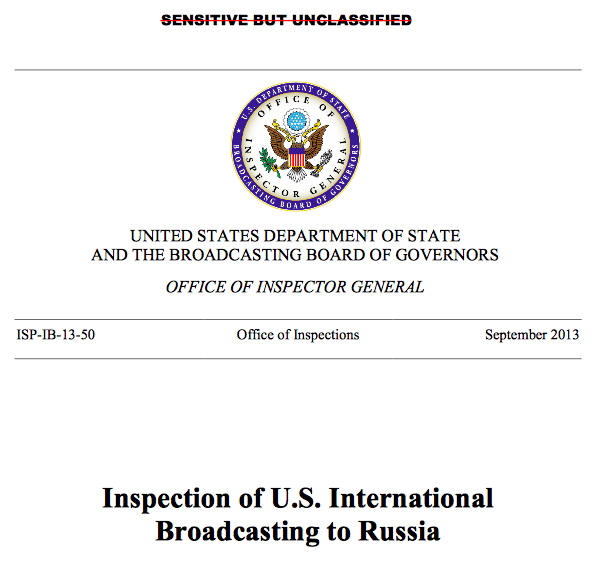BBG Watch Commentary
Two recent articles touched upon a little noticed debate over U.S. response to Vladimir Putin’s propaganda offensive aimed at Russia’s population and the rest of the world. Leonid Bershidsky, a Russian journalist living in exile in Germany concluded that “Russian President Vladimir Putin’s propaganda targeted at audiences outside Russia doesn’t work, but neither will any Western counter-efforts directed at Russians.” (“The World Hates Russia. Russia Hates It Back.” Leonid Bershidsky, BloombergView, August 5, 2015)
We respect Mr. Bershidsky as a journalist and Russia expert (we praised his excellent May 2015 BloombergView op-ed “Why Putin Treats Fantasy as History“) but we find his latest analysis overly pessimistic with regard to Russia. We agree with him that Putin’s propaganda does not have a lot of resonance among well-informed individuals and mainstream media in Europe or in the United States, but vitriolic RT programming does have a strong appeal to fringe political movements. Extremists of various political persuasions who feed on RT propaganda could be very dangerous for democracy and human rights.
Combined with other Russian media and public diplomacy outreach, Putin’s propaganda has also, from the Western democratic and human rights perspective, a wholly negative influence in the developing world. It needs to be countered, not with similarly crude propaganda, but with accurate news and sophisticated analysis appropriately targeted to different audiences. Mr. Bershidsky does not think that countering Putin propaganda can be successful in Russia. We believe that it can be successful in the long run, and that it is absolutely essential for the United States to strengthen U.S. information and opinion outreach response to Russian propaganda and disinformation with better management and more funding from Congress. A few Voice of America (VOA) English newsroom reporters who recently called for a “swift and complete renunciation of the idea that VOA would engage in countering violent extremism” from such terrorist groups as ISIS, and presumably are also against “countering” Putin propaganda, should be ignored. They are unable to “respond” to Putin’s propaganda with accurate and objective news and information and opinions presented in a balanced and objective way, which is what “countering” really needs.
 The second significant article on Putin’s propaganda is by Dr. Leon Aron, Resident Scholar and Director of Russian Studies at the American Enterprise Institute. Dr. Aron is also a Governor on the Broadcasting Board of Governors (BBG) which is responsible for all of U.S. government-funded media outreach abroad through the Voice of America (VOA) and such outlets and Radio Free Europe / Radio Liberty (RFE/RL). (Putinformation: Russian propaganda in the age of postmodernism. Leon Aron, American Enterprise Institute, August 3, 2015)
The second significant article on Putin’s propaganda is by Dr. Leon Aron, Resident Scholar and Director of Russian Studies at the American Enterprise Institute. Dr. Aron is also a Governor on the Broadcasting Board of Governors (BBG) which is responsible for all of U.S. government-funded media outreach abroad through the Voice of America (VOA) and such outlets and Radio Free Europe / Radio Liberty (RFE/RL). (Putinformation: Russian propaganda in the age of postmodernism. Leon Aron, American Enterprise Institute, August 3, 2015)
“In the end, the West is likely to prevail in the new confrontation with Putin’s Russia, whatever label history attaches to it, because eventually dignity and truth tend to prevail over dishonor and lies,” Dr. Aron concluded, adding that “This is what happened to the Soviet Union when its people withdrew their support from the regime.”
On the strategic value of media outreach to Russia, we are much more inclined to agree with Dr. Aron than with Leonid Bershidsky, although we can certainly understand some of Mr. Bershidsky pessimism at this time. In our long-term view, the Russians will eventually withdraw their support from Putin or his authoritarian successors, as they did during the Cold War. It may take, however, a long time, as it did during the Cold War. It may also require new program delivery technologies and definitely better program content.
Dr. Aron is not an unconditional optimist. He also noted that “we ought to be aware of the considerable handicaps with which we enter the battle.” This is also very important.
As an overseer of the Voice of America, Dr. Aron had to became aware in the days after publishing his “Putinformation” article how VOA shamefully turned its back on the famous British-American historian of Stalin’s crimes Robert Conquest after the news of his death in Palo Alto, CA became known. Robert Conquest’s death was not only not reported by VOA worldwide English news service, but the VOA Russian service, which especially in light of Putin’s frequent falsifications of history, had every reason to focus on Robert Conquest and his groundbreaking research, dismissed his death with a wholly pedestrian 100-word report. The VOA Russian service report failed to provide any details on the significance of this great historian and his work for Russia and for the West. Fortunately, the VOA Ukrainian service did have in-depth reports about Robert Conquest’s important research of the Ukrainian genocide in the late 1920s and the early 1930s. BBG’s non-federal grantee media outlet, RFE/RL, also provided an excellent analysis of Conquest’s work and its significance for Putin’s Russia.
Dr. Aron noted in his article that “Voice of America’s budget this year is $212 million and that of Radio Free Europe / Radio Liberty $104 million—in a country whose GDP is nine times Russia’s.” He also noted that “the Kremlin bankrolled RT to the tune of $400 million, while the global news agency Rossiya Segodnya (Russia Today) received $170 million.” The BBG’s entire FY15 budget is about $742 million, 34% of which is consumed by the BBG’s bureaucracy and support services of the International Broadcasting Bureau (IBB). The $742 million figure does not include the money spent on the State Department’s public diplomacy outreach.
These comparisons are statistically correct, but it needs to be pointed out that at least in the English language, the United States can offer the world other vast news and information resources, as well as Hollywood and other entertainment (some of it of dubious value, but we will see the VOA programming offer in Russian is not much better), in addition to anything that the ailing VOA can put out. Russia does not have anything approaching such U.S. private sector capabilities in news, information and entertainment in the English language.
The existence of vibrant U.S. private media, which thanks to the Internet and other digital technologies are available in Russia and in many other countries, is good news considering the decline of the Voice of America in recent years and its dismal performance on social media. Even the U.S. State Department English language Facebook page has now slightly more global “Likes” (1,157,377) than the VOA English News page (1,129,885). The New York Times‘ Facebook page alone has nine times as many “Likes” (9,802,921) than VOA’s English News page.
While VOA English news service had nothing on Robert Conquest, The New York Times, The Washington Post, The Wall Street Journal and other U.S. English-language media had plenty to say about him. The Washington Post‘s opinion writer George F. Will observed about Robert Conquest’s historical writing: “Books do not win wars, hot or cold, but they can help to sustain the will to win protracted conflict, producing clarity about the nature of an evil adversary.” (The man who helped kill the Soviet Union with information, George F. Will, The Washington Post, August 7, 2015)
George F. Will’s words would be also our answer to Leonid Bershidsky’s pessimism. Voice of America and Radio Liberty can provide intellectual sustenance to the many Russians who still have open minds, as these radios did during the Cold War. RFE/RL is still capable of producing programming of such quality, now in multi-media formats; VOA English News and the VOA Russian service are not, for the most part.
When it comes to languages other than English, U.S. private media has practically no foreign outreach. While the VOA Russian service had only 100 words about Robert Conquest, it devoted considerable resources to producing two recent video reports: one on the Great Depression in the United States and another one on a Cat Fashion Show in New York which helps fund animal shelters. Both video reports were just as pedestrian as the short VOA Russian news item on Robert Conquest. While the Great Depression was certainly a traumatic period in U.S. economic history, during the same time millions of Ukrainian peasants died in Stalin-engineered famines and mass repressions, which Robert Conquest meticulously documented. This was not mentioned in the VOA Russian U.S. Great Depression video.
The Broadcasting Board of Governors and the U.S. Congress need to work together to reform the Voice of America and the BBG’s even more dysfunctional IBB bureaucracy. But there is at least some reason to be optimistic that Radio Free Europe / Radio Liberty will continue its high-level intellectual response to Putin’s propaganda. For the time being, U.S. taxpayer’s money would be better invested with RFE/RL for any new outreach to Russia, but the Voice of America cannot be allowed to be destroyed by BBG/IBB bureaucracy and some of its own failed managers because it is still very much needed in many other parts of the world.
Показ кошачьих мод в Нью-Йорке (Cat Fashion Show in New York | Voice of America Russian Service Video Report
Великая Депрессия была крупнейшим в истории США экономическим кризисом.
Posted by Голос Америки on Thursday, August 6, 2015
In 2011, the official evaluator Dr. Nikolay Rudenskiy, deputy editor of the independent Russian online media outlet Grani.ru, told the BBG:
“History also matters. There is an apparent scarcity of historical themes on the VOA site. Meanwhile, there is a growing interest in public historical debate in Russia, and the site shouldn’t stay away from it.”
Dr. Rudenskiy’s advice appears to be for whatever reason still ignored. He also concluded in 2011 that the VOA Russian service website had a “pro-Putin bias”
We suspect that the VOA Russian service production of videos such as the one on the Great Depression in the U.S. and the one on the Cat Fashion Show in New York may be driven by a desire to attract an audience with content that would appeal to anti-American Russians fed by Putin’s propaganda. Such poorly-produced videos, in terms of concept, content and balance, as well as production values, might even be used by a Kremlin-approved Russian TV station wanting to show that America is a country in an economic and cultural decline.
Such program placement may please some BBG officials who can then point to higher audience figures for VOA in Russia. We believe that VOA’s audience in many countries is gained through such questionable program placement. Audience reach claimed by the BBG for VOA is also questionable. It is certainly true that such placement in some cases has little to do with mission-support and may have little or even negative impact. Self-censorship of placement programs is often practiced and encouraged by the management to avoid news or other topics that may offend foreign governments and in some cases to include topics that would be well received.
One former highly regarded and successful Russian Service broadcaster suggested that Dr. Aron, who was a popular weekly contributor at the Voice of America’s Russian language radio and television show Gliadya iz Ameriki (Looking from America) from 1990 to 2004, should launch a full BBG Board review of current VOA Russian service programming, starting with an analysis of its leadership and management which was the focus of the Office of Inspector General (OIG) September 2013 “Inspection of U.S. International Broadcasting to Russia.” Some of the OIG report’s findings may still be relevant judging by the service’s uneven performance and its failure to report on the significance for Putin’s Russia of Robert Conquest’s landmark research after the news of his death was announced last week.

